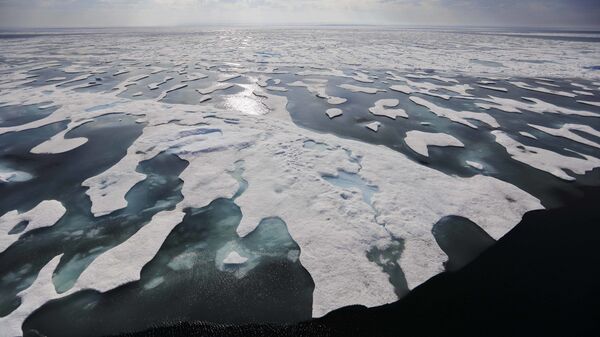The Arctic sea ice is melting faster than climate models predicted, researchers at the University of Copenhagen and the Danish Meteorological Institute have warned.
Unlike previous climate models that forecast a slow and steady rise in Arctic temperatures, the new study shows the warming is occurring at a more rapid pace.
“We have been clearly underestimating the rate of temperature increases in the atmosphere nearest to the sea level, which has ultimately caused sea ice to disappear faster than we had anticipated”, University of Copenhagen professor Jens Hesselbjerg Christensen said in a statement.
Their findings suggest that the unusually high temperatures currently being seen in the Arctic Ocean were only observed during the previous Ice Age. At that time – between 120,000 and 11,000 years ago – the area around Greenland experienced a series of violent and sudden climate fluctuations, where the temperature rose several times by up to 10-12 degrees over short spans of 100-200 years, after which it dropped again.
According to their analysis, air temperature near the surface of the Arctic Ocean has risen by an average of as much as one degree per decade over the last 40 years. In some areas it has risen by almost two degrees.
“So we are talking almost eight degrees in 40 years in some places. It goes far, far faster with the temperature rises than we have calculated in most of our models”, Jens Hesselbjerg Christensen stressed in an interview with Danish Radio. “Changes are occurring so rapidly during the summer months that sea ice is likely to disappear faster than most climate models have ever predicted”, Hesselbjerg Christensen stressed.
Seen with today's optics, this could mean that the summertime sea ice may disappear completely quite soon, maybe by the 2030s, the researchers warned.
And as if that were not enough, the warming is further amplified the faster the ice shrinks, a consequence of the albedo effect, which measures the diffuse reflection of solar radiation out of the total solar radiation. A light surface – such as ice or snow – has a high albedo effect because it can reflect a large part of the Sun's light back towards space. By contrast, a dark surface – such as seawater – has a low albedo effect because it absorbs most of the energy from the Sun's rays and with it the heat. In other words, a sea without sea ice heats up much faster than a sea covered with ice.
“Not surprisingly, we can therefore also see that the warming is greatest in the areas where the sea ice has receded. Among other places, in the Barents Sea in the eastern Arctic”, Jens Hesselbjerg Christensen stressed.
The receding ice bodes ill for all levels of the ecosystem, he warned. Starting from algae, which are eaten by plankton, to small fish, birds and seals and up to polar bears.
Incidentally, the melting ice opens up potentially lucrative shipping routes, such as the Northern Sea Route and the Northwest Passage claimed by Russia and Canada respectively, yet contested by other nations, Hesselbjerg Christensen said, warning of a geopolitical dimension to the issue.




